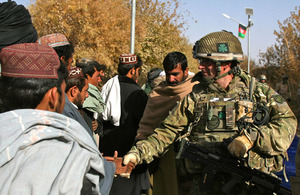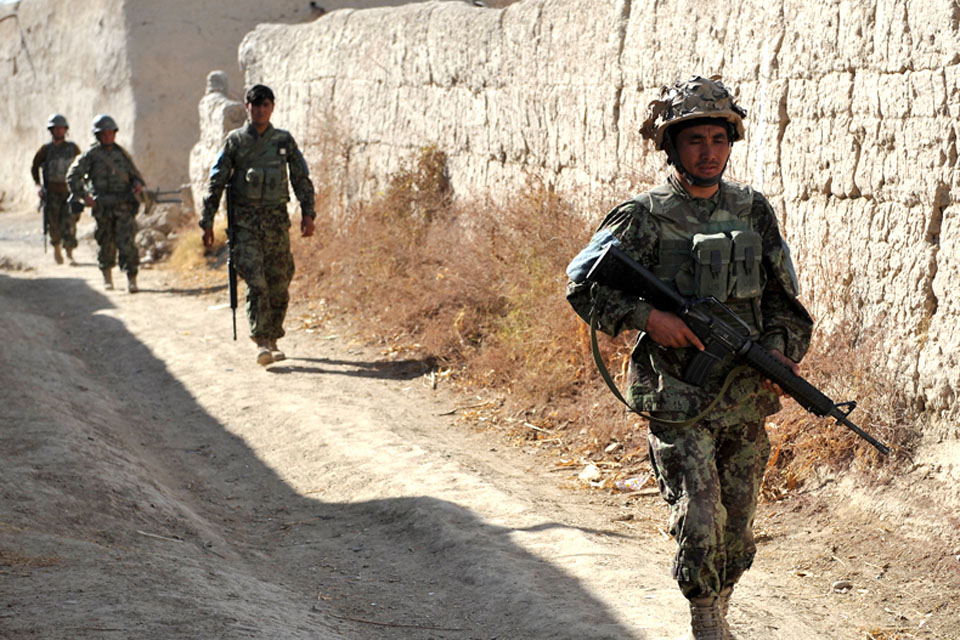Liam Fox delivers Afghanistan update
Defence Secretary Dr Liam Fox has delivered the latest Government quarterly update on Afghanistan to Parliament, highlighting the growing force levels and ability of Afghan security forces as the key to progress.

Lieutenant Colonel Colin Weir, Commanding Officer of 1st Battalion The Royal Irish Regiment, meets locals from Sayedabad ahead of a village shura (stock image) [Picture: Lance Corporal Gavin Fox, Crown Copyright/MOD 2011]
In the update Dr Fox focused on the progress being made in making central Helmand more secure. He reminded his audience that of Afghanistan’s 401 districts, 60 per cent of the violence occurs in just nine of them, eight of which are in Helmand and Kandahar.
Beginning with the issue of force levels, Dr Fox clarified that, while the previous government announced on 30 November 2009 that it had increased the endorsed UK force level to 9,500, Special Forces and the support they need, along with 200 troops deployed to protect Kandahar Airfield and a similar number of personnel from the Allied Rapid Reaction Corps deployed to the ISAF Joint Command for 12 months, take our numbers to over 10,000.
However, Dr Fox said force levels were under constant review and some reductions this year may be possible depending on conditions on the ground and the implementation of the security transition process.
Echoing the words of General Petraeus, Dr Fox said that in central Helmand ‘we have not yet seen success or victory, but we are seeing progress’.
Dr Fox said:
The increase in Afghan and ISAF forces has enabled us to take the fight to the insurgency and, understandably, this has led to an overall increase in the number of violent incidents.
But over the last three months, although still higher than in previous years, we are seeing a trend of falling security incidents.
For example, in the Marjah district of Helmand province, security incidents have fallen from a high of around 25 a day at the height of summer to just three or four a day at present.

Members of the Afghan National Army on patrol in northern Nad 'Ali (stock image) [Picture: Sergeant Rupert Frere, Crown Copyright/MOD 2011]
While acknowledging that this is a seasonal pattern, as many insurgents, especially those fighting for financial rather than ideological reasons, return to their homes for the winter, the fall in the number of incidents is more likely than in previous years to be an indicator of progress. Adding a word of caution he said:
2011 will be just as difficult as 2010, but there will be distinct differences.
The increased number of ANSF [Afghan National Security Forces] and ISAF forces allows us to arrest the momentum of the insurgency in more areas.
Afghan forces will also begin to take the lead for security as the first districts and provinces begin the process of transition.
Dr Fox said there are now over 152,000 Afghan National Army and 117,000 Afghan National Police members and this is on schedule to meet the October 2011 growth target to deliver 305,600 ANSF.
Progress was also highlighted in the implementation of the Afghan Local Police (ALP) initiative:
This is a temporary programme of village-owned security aimed at providing a security effect in areas with limited or no ANSF presence,” Dr Fox explained.
He said that fourteen sites have been established and 2,800 ALP have been recruited, and, once the necessary security and capacity are established, these local forces will be integrated into the regular ANSF:
In Helmand, our bilateral police mission has focused on training Afghan National Police at the Helmand Police Training Centre, from which the 2,000th officer graduated in December,” Dr Fox added.
The UK Government has funded the building of six new police stations in Helmand in the last six months, with ten more in construction and 28 more in design.
On the issue of transition of security responsibility to these forces, Dr Fox said that following the NATO Lisbon Summit, the transition process is on track:
The Joint Afghan-NATO Transition Board is set to deliver recommendations this month on which provinces will enter the transition process and President Karzai has now confirmed that he will announce the first phase of transition on 21 March.
Dr Fox said that real progress is being made at the local level across Afghanistan and UK-funded teams from the provincial administration in Lashkar Gah have begun the process of creating a District Community Council in Marjah which, this time last year, was an insurgent stronghold:
In Musa Qal’ah, the newly-elected council is developing a district plan for the Afghan Government to deliver with support from the UK,” Dr Fox said.
At the national level, action plans have been developed for the Afghan Government’s national priority programmes, and we have seen encouraging progress in some areas.
However, the Defence Secretary said that the British Government remains very concerned about levels of corruption, in particular the disturbing allegations around the Kabul Bank.
Concluding, Dr Fox said that, while we have seen progress over the past few months, the need for ‘strategic patience’ remains:
To paraphrase the US Defense Secretary, ‘we need to stop pulling up the tree by its roots to see if it is growing’,” he said.
There is still a lot to do, but also cause for cautious optimism.